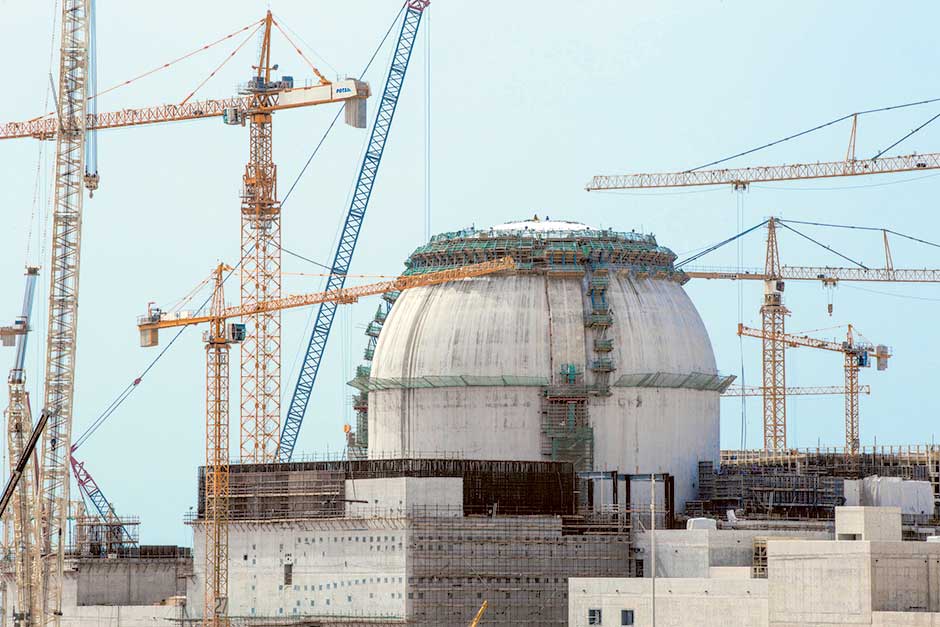UAE bolsters nuclear energy safety
August 22, 2016

American nuclear experts train federal UAE staff on prevention of illicit nuclear equipment imports and exports
Barakah nuclear power plant in the Western Region will supply up to a quarter of the UAE’s electricity demands yearly on completion by 2020.
Image Credit:FANR
Dubai: Nuclear energy experts from the United States are helping the UAE bolster existing border protection measures against illicit shipments of nuclear equipment or materials related to weapons of mass destruction, said federal officials on Sunday.
The United States Department of Energy’s International and Export Control programme experts met over three days with more than a dozen staff members of the UAE’s Federal Authority for Nuclear Regulation (FANR).
The American export control programme is designed to “strengthen global efforts to prevent any unlicensed transfer of materials, equipment, and technology related to weapons of mass destruction (WMD), including nuclear weapons”, said the UAE regulator.
Christer Viktorsson, director-general of FANR, told Gulf News on Sunday that training staff who review material transfers will enforce strict international agreements that call for only peaceful nuclear equipment and materials to be transferred across borders.
“As a party to the Nuclear Non-Proliferation Treaty, the UAE is committed to conducting only peaceful nuclear activities within its borders and also to working with the international community to prevent the illicit transfer of nuclear-weapon-usable materials and technologies,” Viktorsson said in an interview on Sunday.
“Our recent workshop with the US Department of Energy assisted FANR staff members who review all trade applications to transfer nuclear-related items to, from, or through the UAE.”
Viktorsson noted that effective “trade controls are essential tools in international efforts to prevent the proliferation of nuclear weapons, FANR is fully committed to its leading role in the UAE to support these non-proliferation strategies”.
The workshop is part and parcel of new safety regulations imposed by FANR on the Western Region’s Barakah nuclear power plant where the first of four reactor units are expected to go online next year.
All four nuclear reactors are set for completion by 2020 to provide up to a quarter of the country’s electricity demands yearly.
Federal powers of FANR staff as laid out under FANR’s Regulation 9 were reviewed as part of the training for a better understanding of “national export control licensing, industry compliance, and inspections-based enforcement practices designed to prevent the uncontrolled transfer of sensitive items that could be used to build WMD”, said the federal authority.
The UAE has pledged to use nuclear energy, equipment and technology “exclusively for peaceful purposes only and to implement import and export control rules for nuclear and nuclear-related equipment and technology in strict accordance with Nuclear Supplier Group (NSG) Guidelines for Nuclear Transfers. The NSG is a group of nuclear supplier countries that seeks to contribute to the non-proliferation of nuclear weapons through the implementation of two sets of guidelines for nuclear exports and nuclear-related exports”, the authority said.
Ensuring inspections
According to FANR’s Regulation 9 governing import and export of nuclear-related materials, UAE inspectors have full powers to inspect any shipment or premises involved in items related to nuclear power in the country.
The law reads that licensees “shall allow access, without any delay, to the authority to conduct an inspection, which the authority deems to be related to the transfer of regulated items, to verify the correctness and the completeness of the information provided and in compliance with the requirements of the law, this regulation and with conditions of the relevant licences”.
The law also makes its clear that “the authority’s inspectors are authorised to inspect industrial sites, stores or any other sites or locations in the state where regulated items are declared to be located, including, but not limited to, special and free zones in order to … ensure that such items are used for peaceful purposes in accordance with the obligations of the Treaty on the Non-Proliferation of Nuclear Weapons”.
The regulations will help inspectors “investigate any suspicion that the transfer or end use of regulated items is unlicensed or unauthorised”.


